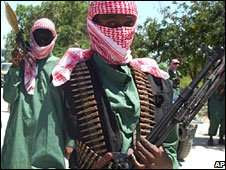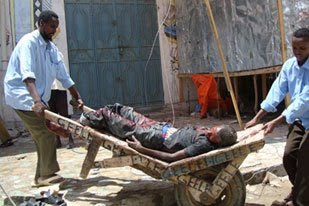Hi All the war between Ethiopia and Somalia still continues and more people are getting hungry i just want to give you information i collected from international medias about the current situation i will try not to bias before sending the current situation please have a look how the war started 2 years back between ethiopia and somail after that i will send you more
Amare
The Ethiopia-Somalia War—In the latest phase of the long Somali Civil War, Ethiopia intervened in late 2006 to aid the internationally- recognized Somali government based in the city of Baidoa. The Transitional Government of Somalia (TGS) is opposed by the Islamic Courts Union (ICU), an Islamist group which seized control of the national capital of Mogadushu earlier in 2006 from a coalition of warlords.
Ethiopia intervened largely to prevent Islamist forces from gaining full control of Somalia. The ICU received support from foreign Islamist groups as well as from Eritrea, Ethiopia's long-time enemy. The Baidoa government and Ethiopia are supported by the United States.
Ethiopian troops first entered Somalia in small numbers in July, 2006, and by November, were engaged in minor clashes with Somali ICU forces. Major combat between the allied TGS and Ethiopian forces and the ICU forces began on December 20, 2006, with combat around the town of Baidoa. Fighting raged for the rest of the week, with a major escalation coming on December 24, when Ethiopian forces bombed Mogadishu airport and Baledogle Airport, about 35 miles outside Mogadishu, while troops seized Belet Weyne, an important border town. Ethiopian troops also took over the towns of Bandiradley, Adadow and Galinsor. The Ethiopian government reported on television that the goal of the offensive was Jowhar, a town not far from Mogadishu.
Later reports cited 1,000 dead and 3,000 wounded as Ethiopian and TGS forces advanced through central Somalia toward the capital.
Ethiopian and government forces entered Mogadishu on Dec. 29, as Islamist forces retreated toward the south, where fighting continued into early January, 2007. The United States Navy patrolled the Somali coastline to prevent the escape by sea of any Islamists. Also, three members of al-Qaida who are wanted for the 1998 Embassy Bombins are reportedly with the Islamists, and the United States is searching for them and seeking their capture.
As the government and Ethiopian forces attempted to bring order to the capital, Islamist forces began guerrilla attacks against them. By the end of 2007, many experts described the ongoing Islamic resistance as an "Iraq-style insurgency," featuring ambushes, improvised explosive devices (IEDs), and an influx of foreign fighters from the Muslim world waging a Jihad against an occupying army.
Though the new Somali government is beginning to function, it still depends on Ethiopia for significant military backing, as combat continues with the Islamic militants.
It should also be noted that inside Ethiopia, the Oromo National Liberation Front (ONLF), which has conducted a guerrilla war against the Addis Abbaba government for decades, is launching attacks against Ethiopian troops headed toward Somalia. The Oromo people are ethnically related to the Somali people.
According to Somalia's Elman Human Rights group, 5,960 civilian fatalities occurred in the capital of Mogadishu in 2007. Also, the group claims that 7,980 civilians were wounded and over 700,000 displaced from their homes due to the continuing war between the Somali government and the Islamic insurgency. Ethiopia is aiding the Somali government; providing troops and air power to fight the insurgents. In December of 2006, Ethiopian forces, with American aid, invaded Islamic forces-held Somali territory and overthrew the extremist Islamic regime and helped install a pro-Western government in its place.
Source:
Somali group: 5,960 killed this year--Associated Press, December 2, 2007
 Abdullahi Yusuf Ahmed was appointed president four years ago
Abdullahi Yusuf Ahmed was appointed president four years ago












